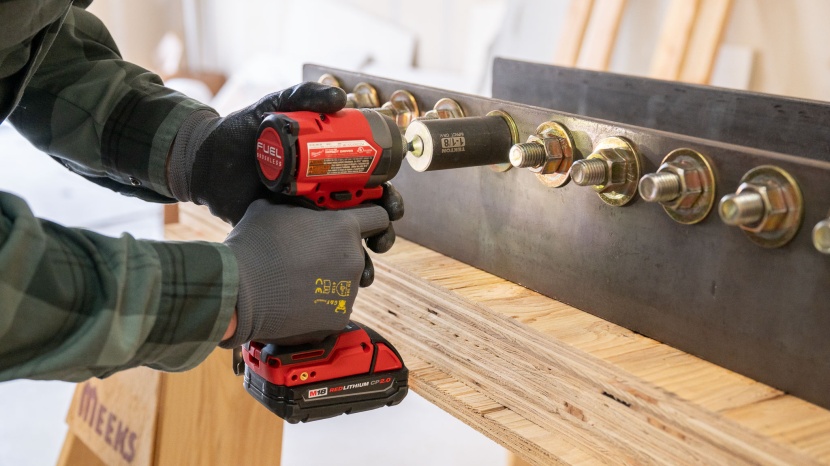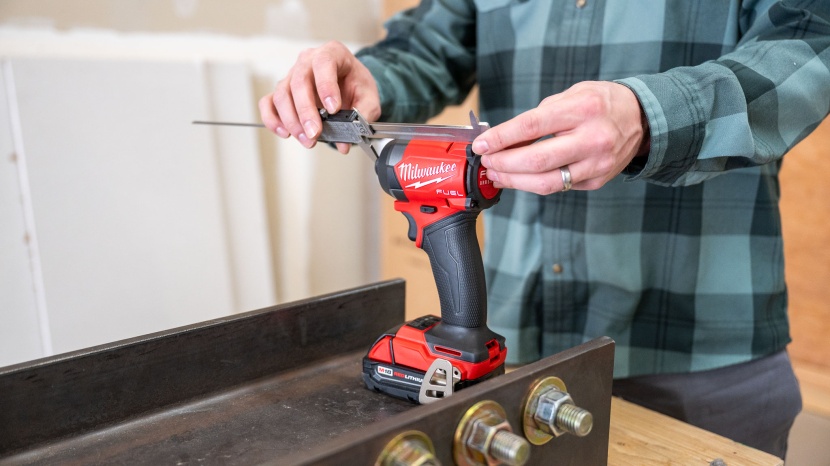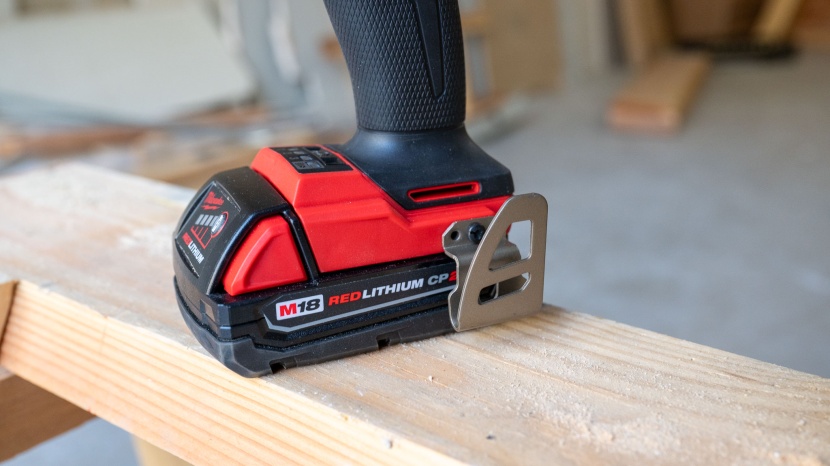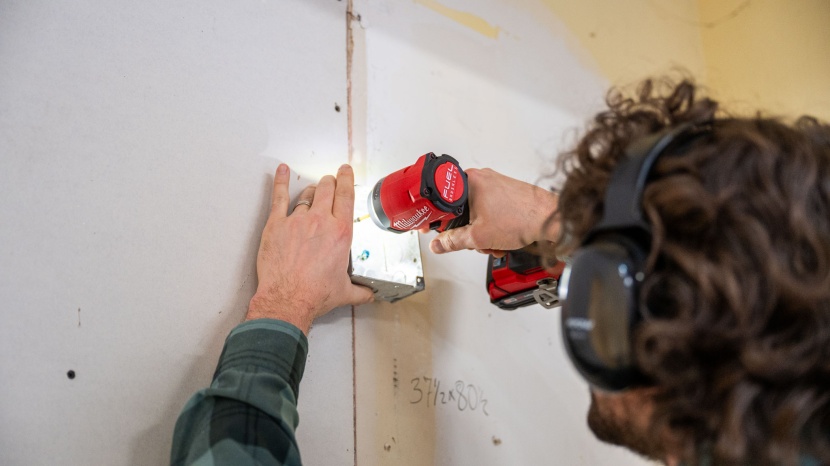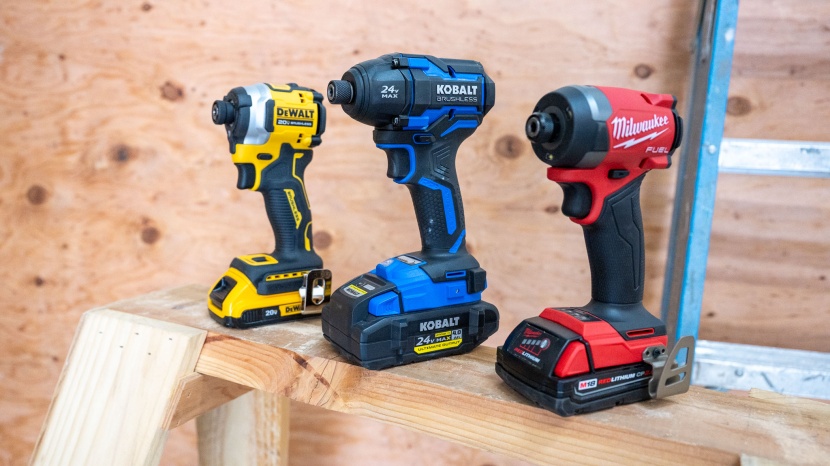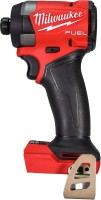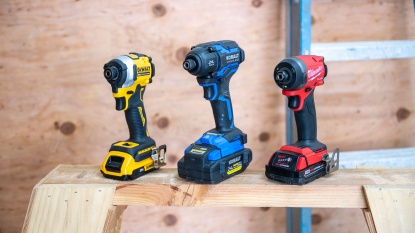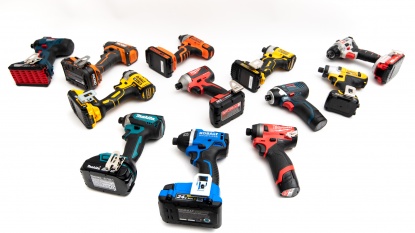
Our Verdict
Our Analysis and Test Results
The Milwaukee M18 Fuel is built tough, founded on their M18 battery family, and features four different drive control modes to accommodate a wide range of tasks with the appropriate level of force. Three bright lights surround the hex quick-change chuck to illuminate your work surface and allow you to power through any job with ease. The Milwaukee is quite compact, allowing it to fit easily in those hard-to-reach areas and get the job done quickly and conveniently.
Speed
To test the speed performance of each impact driver, I stacked plywood to accommodate driving 3-5/8" ledger screws and 1/2" x 3" lag bolts. With the stack of plywood, I time how long it takes the impact driver to fully drive a ledger screw several times. The results are an average of several different tests. I apply the same process with 1/2" x 3" lag bolts.
The final portion of our speed testing involves driving ledger screws into a stack of three 2" x 12"s to provide some variation in the surface being driven into. All tests are performed with slightly drained batteries so as to rule out power spiking and keep a level playing field when testing each impact driver.
The Milwaukee M18 Fuel Impact Driver is a powerhouse, and its performance in our speed testing reflects that. In all three of our speed tests, the Milwaukee was one of the fastest impact drivers I tested. It consistently drove three 5/8" ledger screws in just three seconds. The lag bolt test also showcased the speed of the Milwuakee, where it drove in the 1/2" x 3" lag bolt in 11 seconds and removed it in four seconds. When switching to a different material, the pace set by the Milwaukee only increased, where it averaged just under three seconds when driving into the stack of 2" x 12" pieces of lumber.
Torque
To evaluate torque capability, I welded several 1/2" grade 8 bolts into a steel I-beam and fastened large steel nuts and washers to it, giving each driver five seconds to tighten them as much as possible. After tightening with the impact driver, I use a torque wrench to tighten the bolt, starting low and gradually increasing until the bolt moves. I then record (in foot-pounds) how tight the impact driver could tighten the bolt.
I also test each driver's breaking capability by using a torque wrench to tighten a series of nuts and washers to the bolts welded to the steel I-beam to increasingly tighter torque measurements and see which impact drivers are capable of loosening them. I started the torque measurements at 75 foot-pounds and gradually increased them by 25 until it reached 300.
The capable Milwaukee ripped through our torque testing with ease. Where many others struggled to fasten the bolts more than 100 foot-pounds, the Milwaukee torqued each bolt down to 300 plus foot-pounds in the five-second tightening period.
Convenience
I assess each impact driver's range of capability, taking into consideration different fastening modes, the effectiveness of the light, the dimensions and how well it fits into hard-to-reach places, and any other features that may cater to end users to help them comfortably get the job done.
Featuring four different fastening modes, the Milwaukee starts out at 1,700 RPMs and climbs from there to 2,800 and 3,250. The final mode is designed for driving self-tapping screws into sheet metal. However, I found that the first mode might not be delicate enough for some jobs. The tri-LED work lights are phenomenal, casting light evenly all around, and are activated as soon as the impact driver starts to move.
From front to back, the Milwaukee spans only 114 mm, leaving the Milwaukee with quite an advantage when working in tight spaces and allowing you to find the right angle for any task. Although it doesn't feature a bit holder, it does have a quick quick-change collet to make bit changes fast and convenient. Most well-designed tools feature a belt clip, and the Milwaukee is no exception.
Battery
To test impact driver batteries, I had my work cut out for me. Starting with a full battery, I drove 14 3-5/8" ledger screws in a row, followed by driving and then removing a 1/2" x 3" lag bolt, and repeating this process until I drained the battery. This particular impact was tested using the M18 Redlithium CP 2.0 amp hour battery from Milwaukee. When testing other impact drivers, I use their 2.0 capacity battery or the nearest equivalent.
The M18 Fuel made it through just over three sets in, finishing out driving only nine of the fourteen ledger screws in its fourth round of battery testing. I was hoping for a slightly better battery, but it performed better than more than half of the other impact drivers I tested. And, it's an easy fix to shop around for a bigger battery.
Noise
In order to evaluate the noise of impact drivers, I referenced two different organizations for sound level safety — the National Institue for Occupational Safety and Health (NIOSH) and the Occupational Safety and Health Administration (OSHA). During speed testing, I set up a sound pressure level meter, which is a device that measures sound in decibels to capture readings for each impact and see where they fall on the safety organizations' charts.
Power tools, in general, can be quite loud, and impact drivers are no exception. For reference, NIOSH considers that a sound level of 94 decibels is safe for the duration of one hour, and OSHA considers a sound level of 105 decibels to be safe for one hour. Exposure above these limits is considered a risk for noise-induced hearing loss. When testing the Milwaukee, I recorded an average of 92 decibels when driving screws during our speed assessment. While this noise level would allow you a few hours of use within the range of acceptable use by NIOSH and OSHA standards, long-term use would require hearing protection to protect your ears.
Should You Buy the Milwaukee M18 Fuel Impact Driver?
The Milwaukee M18 Fuel is a robust impact driver with seemingly endless power and a compact size, allowing you to access all those hard-to-reach places and get the job done. I love the integrated tri-LED worklights and quick-change bit collet. If you're looking for a powerful and compact impact driver, the Milwaukee is a great choice and would be a welcomed addition to your toolbox.
What Other Impact Drivers Should You Consider?
If you're in the market for an impact driver and still don't feel like you've found the right one, be sure to check out our comprehensive review of the best impact drivers on the market. The Kobalt XTR Max 24V is a nearly faultless option if your budget allows. It's an excellent driver that excels in every test, with especially good battery efficiency performance. The Kobalt is incredibly fast, completing our lag bolt test in just 13 seconds and a ledger screw in 3 seconds. That said, it's a heavy investment. So, if you're a DIYer on a tight budget, the Black+Decker 12V Max is an accessible driver for almost any budget that will get the job done, though it's torque is much less powerful, and it will need to be recharged more frequently.
| Awards | Best Tool-Only Impact Driver |
|---|---|
| Price | $150 List Check Price at Amazon |
Overall Score  |
|
| Star Rating | |
| Bottom Line | A powerful impact driver featuring four drive control modes, excellent lighting, and a narrow footprint |
| Pros | Powerful torque, four modes, great light, quick bit insert |
| Cons | Potentially too powerful for delicate work |
| Rating Categories | Milwaukee M18 Fuel 2953 |
| Speed (35%) | |
| Torque (25%) | |
| Convenience (20%) | |
| Battery (15%) | |
| Noise (5%) | |
| Specifications | Milwaukee M18 Fuel 2953 |
| Average Measured Total Time for Lag Bolt Test | 15 seconds |
| Average Measured Time: Plywood Ledger Screw Test | 3 seconds |
| Average Measured Fastening Torque | 300 ft-lb |
| Average Measured Breaking Torque | 300 ft-lb |
| Measured Length | 114 mm |
| Average Measured Decibels While Using | 92 dBa |
| Impact Driver Model # | 2953-20 |
| Quick Bit Insert | Yes |
| Bit Holder | No |
| Multiple Fastening Modes | Yes |



